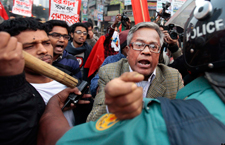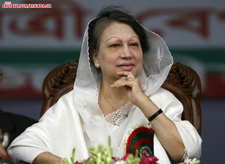
If this often quoted maxim by Mao is relevant today; at no place in the world is this more relevant than Bangladesh. As the previous government completed its five years term and waits for the next elections to be held sometime in January next year, the nation is boiling and how.
In the last two weeks, as many as 60 people have died in the nationwide shut-down, locally called Hartal. The shut-down was called by the opposition alliance of 18 big and small parties led by Bangladesh Nationalist Party (BNP) and was effective for 60 hours leading to an estimated financial loss of 1.6 Bn Taka.
Such shut-downs are common in Bangladesh and the country has had a history of even bigger Hartals. But that does not mean people have started to develop a liking for it. At the most they tolerate it as an essential instrument in the process of democratization. And this Hartal was no different.
The reason behind the present shut-down was opposition’s protest against the move by the ruling Awami League (AL) and the Election Commission to hold the up-coming Parliamentary Elections under the supervision of the ruling party and not the caretaker government as in the past.
 In at least four previous elections, there has been some or other caretaker government which has overseen the polls. However, because of a Parliamentary provision passed by the ruling formation, without the consultation of opposition, the law has been changed. Across the Bangladesh political spectrum, different analysts have different take on the new provision. Some consider it in sync with the global tradition and popular trend whereas other dismisses it as a non-starter in a not-so-matured democracy like Bangladesh.
In at least four previous elections, there has been some or other caretaker government which has overseen the polls. However, because of a Parliamentary provision passed by the ruling formation, without the consultation of opposition, the law has been changed. Across the Bangladesh political spectrum, different analysts have different take on the new provision. Some consider it in sync with the global tradition and popular trend whereas other dismisses it as a non-starter in a not-so-matured democracy like Bangladesh.
“Interestingly, every time after the election since 1991, the incumbent party has lost which had accused that the election was unfair and hijacked by the caretaker government, which was biased in making sure that it lost. So, why this fallacy about hosting an election under a caretaker government when no matter how neutral it was and how fairly it may have been conducted the election process, the losers are always going to cry foul? I am sure a reasonable solution can be found if the parties are willing to make some concessions. If they don’t get to that desired solution, they will take the country to a situation in which a repeat of the so-called 1/11 when military took control would become inevitable,” says noted Bangladeshi political analyst and human rights activist, Dr. Habib Siddiqui.
But the warring Begums appear to have some different ideas and are unwilling to compromise. The reason behind this stubbornness and inflexibility is the extreme hatred that both of them have for each other. And that has threatened to suck in everything that comes in between.
But that is just the half of it. It is equally true that after five tumulus years, Sheikh Hasina is on a sticky wicket and it will take a miracle to win her another term in continuation. There are reasons behind that.
The primary reason is her very divisive so-called International Tribunal to punish the genocide perpetrators of 1971 War of Independence. Most of those who have been convicted are from the opposition Jamat-e-Islami which is a coalition partner of BNP. While a section of urban liberals welcomed the entire process, a large section of people saw it as a personal vendetta against the opposition figures.
“It was all phoney. No international law was followed. No procedure was followed. The witnesses were weak and were never scrutinized for biases. And how can it be a legitimate tribunal if it does not convict Awami League cadres who killed ethnic Biharis?” asks Kamal Ahmad, political analyst and a vocal critic of the tribunal and its way of functioning.
And if that was not enough, Jamaat’s registration as a political party was also cancelled by the government. The protest that followed saw over 100 opposition cadre dead in indiscriminate firings. This has not only galvanised the opposition cadre but has also prompted them to fight for their political survival. No doubt they will vote in-masse for the opposition BNP.
Under the circumstances, the opposition legitimately believe that Awami League will use its influence inside Election Commission to rig the election. Some of the recent decisions of EC have only helped this impression.
 Writing in one of Bangladesh’s biggest English newspapers, Daily Star, noted journalist Farid Hossain reflected, “The commission has recently published on its website the draft of the amended electoral code of conduct that bars the prime minister, the leader of the opposition, ministers and members of parliament from using any sort of government facilities during the election campaign. This reality has raised questions about how the EC is going to ensure a real level-playing field for all the candidates. The electoral code of conduct might look attractive on its face, but it will be of no use if the EC fails to execute it properly. What happens if the VVIPS like the PM and Leader of the opposition do not completely adhere to the code of conduct? Will the EC be able to penalise such VVIPS should they violate the rules.”
Writing in one of Bangladesh’s biggest English newspapers, Daily Star, noted journalist Farid Hossain reflected, “The commission has recently published on its website the draft of the amended electoral code of conduct that bars the prime minister, the leader of the opposition, ministers and members of parliament from using any sort of government facilities during the election campaign. This reality has raised questions about how the EC is going to ensure a real level-playing field for all the candidates. The electoral code of conduct might look attractive on its face, but it will be of no use if the EC fails to execute it properly. What happens if the VVIPS like the PM and Leader of the opposition do not completely adhere to the code of conduct? Will the EC be able to penalise such VVIPS should they violate the rules.”
Some of the recent opinion polls have also been not very encouraging for the ruling formation. A poll conducted by an internationally acclaimed Think Tank in collaboration with a pro-government newspaper had opposition leading by a huge margin. The poll was one of the most widespread in the history of Bangladesh Exit Polls and covered 14 districts, two each from all the seven divisions. While 55 percent of the respondents expected opposition BNP to win, the corresponding figure for the ruling formation was a little less than 30 percent. That kind of gap, which outweighs the margin of error by ten times, is not a good indication for Sheikh Hasina.
The warning bells are ringing. The war horns have rung. Only the time will tell which of the two Begums will see the inside of the PMO next.























